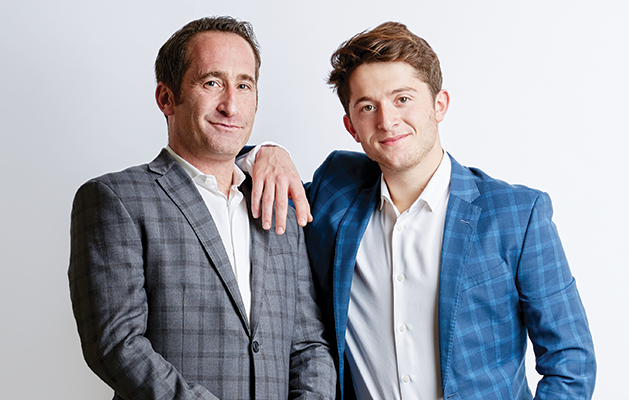
Hovering above two desks on opposite sides of a wall are two faux neon pictures—one of the letter X, the other a Z.
This is no coincidence. David Stillman, the 49-year-old Generation Xer, sits at the desk under the X. His son, Jonah, the 18-year-old Generation Zer, sits under the Z.
Those two letters succinctly illustrate what David and Jonah are trying to accomplish in their second-floor offices overlooking Water Street in Excelsior. It’s the mission of the management consulting business they co-founded, GenZGuru. After all, the duo bill themselves as the first father-son Gen X-Gen Z speaking team on their website. “I’m the X, and he’s the Z, for obvious reasons,” David says.
The Tonka Bay father and son teamed up three years ago to “pioneer a dialogue”—as David often calls it—on what makes Gen Zers (those born between 1995 and 2012) unique. He and Jonah travel the country doing speeches, workshops and consulting work for businesses, colleges and nonprofits. They offer guidance on retaining and recruiting Gen Z workers or students, and ways to sway them to buy their products or join their cause.
They even co-wrote a book last year on the topic: Gen Z @ Work. David says it was the first book published about Gen Zers in the workplace, and it’s an opportune time for such a discussion. The oldest Gen Zers are now jumping into the workforce. “We educate companies on who is this next generation, how are they going to be different, what you need to do about it,” he says.
David has spent 20 years studying the generations—traditionalists, baby boomers, Xers, millennials, Zers. He co-founded a training company focused on how people from different generations work together but sold the company in 2008.
After graduating from Minnetonka High School last June, Jonah is in the midst of a gap year, working full-time at GenZGuru as a voice for his generation. Jonah “tells people, ‘Here’s who we are and why,’” says David, who has two other children with wife Sharon. “And I tell them what it means for the rest of us.”
Beginnings
As part of the Minnetonka High School VANTAGE program, which immerses students in the business community, Jonah and his classmates did one of the first national studies on the workplace attitudes of Gen Zers.
“The data was compelling,” David says. “It proved how different Gen Z was from the millennials. That fueled us to do one more study, and that data was even more compelling.” Jonah asked his dad if he would ever get back on the speaking circuit, which had been part of his role with his former company—but this time, they could focus on Gen Z. If David said yes, Jonah wanted to be involved.
“It sparked a light bulb,” David says. They went forward with the idea after getting the school’s blessing. “If there’s one thing I know about the generations, it’s [that the message is] received better if it comes from the source. So I knew that learning about Gen Z was important now, and I had a Gen Zer interested in sharing the information.”
Business has been booming, and Jonah’s perspective plays a valuable role. David says Jonah’s first-hand knowledge of Gen Zers is a big part of the business. But, in the end, their conclusions are backed by data.
“There’s not a day that goes by that someone doesn’t reach out to him and say he’s pioneering a dialogue in a good way,” David says. “You have to be careful, because some Gen Zers will give the generation a bad name and be flippant. Jonah does a good job of saying, it’s not out with the old, in with the new. It’s all of us.”
Jonah made news when he was hired last September by the Minnesota Vikings to help them find ways to attract the next generation of fans. He admits it’s exciting since he’s “bled purple his entire life.” He will serve as a part-time consultant though GenZGuru during his gap year from college. “They’re focused on recruiting the next generation of fans,” Jonah says. “While we might not be the ones spending money on tickets now, 10 years down the line, we will. They’re taking the initiative to recruit us now.”
The Stillmans have also consulted with 3M on Post-it notes. They say data shows Gen Zers prefer to write messages down, instead of typing them into their phones. “They’re like physical tweets,” Jonah says. “They’re little sound bites of information.”
They even have had conversations about being the subjects of a reality TV show, or developing a new clothing line. “We’re keeping our minds open to anything,” David says. “But we’re picking partners selectively.”
Needing more office space, GenZGuru moved into their current Excelsior location last September. Previously, the Stillmans had been working out of their house. Another reason for the move was to draw a line between David and Jonah’s personal and professional relationship.
“At the end of the day, he still is my dad,” Jonah says. “But when we’re at the office, it’s not what he says goes. He goes through the same thing. We’re business partners.”
David agrees. “It’s hard to go from dad at home with a flip of the switch,” he says. “You have to at times. But here, it’s all business.”
“Phigital”
So what’s the Gen Z mindset?
Forget boundaries, Jonah says. The Stillmans call that “phigital:” the blending of the physical and digital worlds. Think Pokémon Go. “Whether I’m loading groceries into a cart in the supermarket or adding an item to a cart on Amazon, it’s one and the same,” Jonah says. “I’ve only known a world where my phone is always smart. Technology isn’t even ‘second nature’ to us. It’s just part of who we are.”
David says Jonah has added a high-tech component to the business. That includes an app, allowing their audience during speeches to interact with them through trivia and polls.
“The old me would have never embraced an interactive app, videos, customization of speeches,” David says. “He’s taken the keynote speaker market to another level.”
Other Gen Zer traits, backed by data and highlighted in their book, include being pragmatic and competitive. Pragmatic indeed—Jonah says he’s not committed to going to college next year. “I’m doing what I want to be doing right now—mastering my craft,” he says. “I’ve never been a huge school person. I’ve always liked doing tangible work projects more.”
He says his decision is a trend among Gen Zers. One reason? College is expensive. “We can’t go bounce around for a year and not declare a major and waste $45,000,” he says. “Now you have a generation that’s saying, I don’t know what I want to do. I’m going to take some time off and figure it out.”
It wasn’t easy at first for David to accept Jonah’s decision. He admits it probably sounds hypocritical, considering how much he’s studied generations questioning traditional paths. But he sees firsthand how much Jonah is accomplishing. “He’s learning so much—way more than I did at that age,” he says. David says part of the reason he sold his previous company was that he was tired of the travel. But now, being on the road is fun, because he gets to do it with his son. “I love to see my business doing so well, but in my role as dad, I love seeing my son do so well,” he says. “I’m a proud dad.”
Find out more about the Stillmans and their work on Gen Z at the website here.









